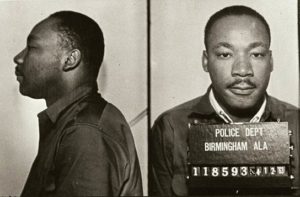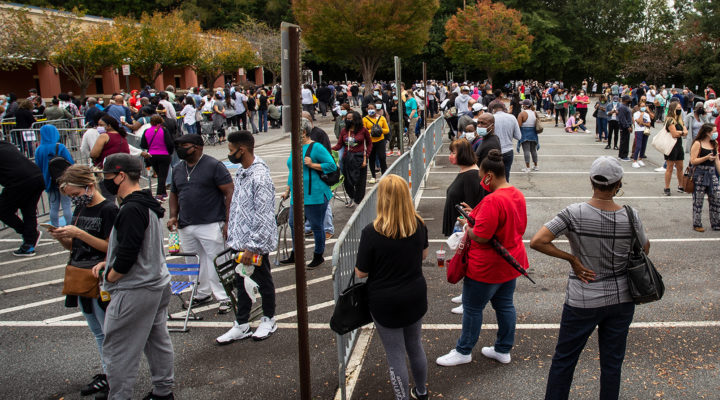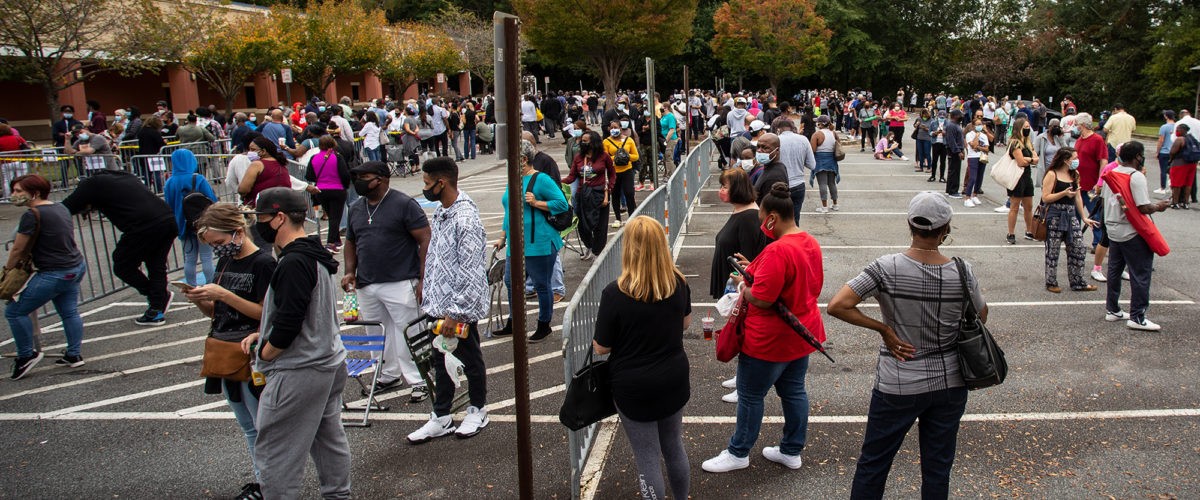On Good Friday, April 12, 1963, Martin Luther King Jr. was arrested in Birmingham, Ala., for leading an “unlawful” protest in the city. That same day, a group of eight clergymen including five bishops (Catholic, Episcopal, Methodist), a Presbyterian, a Baptist, and a Jewish rabbi, signed a document acknowledging racial injustice, but warning, “We are now confronted by a series of demonstrations by some of our Negro citizens directed and led in part by outsiders. We recognize the natural impatience of people who feel that their hopes are slow in being realized. But we are convinced that these demonstrations are unwise and untimely.”

Bill Leonard
On April 16, 1963, two days after Easter Sunday, King, the imprisoned “outsider” in that voter-suppressing, segregation-saturated city, responded with his Letter from Birmingham Jail, declaring: “I am in Birmingham because injustice is here. Just as the prophets of the eighth century B.C. left their villages and carried their ‘thus saith the Lord’ far beyond the boundaries of their hometowns, and just as the Apostle Paul left his village of Tarsus and carried the gospel of Jesus Christ to the far corners of the Greco-Roman world, so am I compelled to carry the gospel of freedom beyond my own hometown. Like Paul, I must constantly respond to the Macedonian call for aid.”
For King the Baptist preacher, racial injustice required a gospel response — even, no, especially during Holy Week.
He continued: “Moreover, I am cognizant of the interrelatedness of all communities and states. I cannot sit idly by in Atlanta and not be concerned about what happens in Birmingham. Injustice anywhere is a threat to justice everywhere. We are caught in an inescapable network of mutuality, tied in a single garment of destiny. Whatever affects one directly, affects all indirectly. Never again can we afford to live with the narrow, provincial ‘outside agitator’ idea. Anyone who lives inside the United States can never be considered an outsider anywhere within its bounds.”
Fifty-eight Holy Weeks later, “injustice anywhere” remains “a threat to justice everywhere,” especially in the land of the free and the home of voter suppression. This time it’s happening in Georgia, King’s home state.
One week before Good Friday 2021, Gov. Brian Kemp signed into law new voting legislation filled with multiple restrictions, clearly intended to make voting difficult, especially for “our Negro citizens,” as the Birmingham ministers described that constituency almost six decades earlier.
Said Kemp: “There’s no doubt there were many alarming issues with how the election was handled, and those problems, understandably, led to a crisis of confidence in the ballot box here in Georgia.”
“The only ‘alarming issues’ were a manufactured ‘crisis of confidence’ after voters in two well-certified presidential and senatorial races selected three candidates from a party other than Kemp’s.”
Truth is, the only “alarming issues” were a manufactured “crisis of confidence” after voters in two well-certified presidential and senatorial races selected three candidates from a party other than Kemp’s. Study after study indicates that there was no “widespread voter fraud,” a fact verified in multiple internal state audits. Yet the lies continue.
The Georgia legislation is the result of those Republican losses. CNN reports that the regulations now limit “drop boxes to inside of early voting locations during voting hours, make giving food or drinks to a voter a misdemeanor, allow for unlimited challenges to voter registrations and eligibility, set up a fraud hotline, and require counties to keep counting ballots without a break in between.” It also shortens “the runoff cycle from the current nine weeks to just four weeks,” and permits legislative takeovers of local elections. (The latter mandate may be the greatest danger, given attempts to have state legislatures overturn the recent presidential election.)
These egregious voter restrictions carry the entire nation back to King’s jail-based epistle, events then and now that parallel Holy Week. On the way to Easter 2021, Georgia lawmakers transformed a gospel mandate into a misdemeanor. Remember Jesus’ words? “Whoever gives even a cup of cold water to one of these little ones in the name of a disciple — truly I tell you, none of these will lose their reward.”
A suit filed against that legislation notes that in the 2020 election, “the average wait time in Georgia after polls were scheduled to close was six minutes in neighborhoods that were at least 90% white, and 51 minutes in places that were at least 90% nonwhite.”
When some voters waited up to eight hours at some polling places, others humanely brought them water and snacks. The new law criminalized that option. Apparently, not one “evangelical” legislator who voted for the policy had read or remembered Matthew 10:40.
“Apparently, not one ‘evangelical’ legislator who voted for the policy had read or remembered Matthew 10:40.”
Georgia is only the beginning. So far, more than 200 new voter regulations have been proposed in some 40 states. The Heritage Foundation proposes to spend at least $24 million toward such voter legislation in eight swing states, facilitated through its Heritage Action for America office.
Georgia Sen. Raphael Warnock, a successor to King at Atlanta’s Ebenezer Baptist Church, recently warned that a new generation of Jim Crow-like legislation is coming “to a state capital near you,” threats that create a “defining moment in American democracy.”
Therein lies the challenge to our generation. How will we respond to yet another threat to voter rights and freedom in the American Republic? Among other things, the disturbing Georgia legislation illustrates dramatically why it is important that educational and ecclesiastical institutions revisit and respond to their origins in and benefit from the Slavery-Lost-Cause-Jim-Crow-oriented culture of the South and its ceaseless impact on the entire American nation.
The underlying ideologies that fostered those practices are not residue of the nation’s distant past. They remain with us, and yes, inside us, here and now. Will we find courage to protest in this “defining moment?”

(Photo: Public domain)
In his Letter from Birmingham Jail, King wrote: “One day the South will recognize its real heroes … . They will be the young high school and college students, the young ministers of the gospel and a host of their elders, courageously and nonviolently sitting in at lunch counters and willingly going to jail for conscience’ sake. One day the South will know that when these disinherited children of God sat down at lunch counters, they were in reality standing up for what is best in the American dream and for the most sacred values in our Judaeo Christian heritage, thereby bringing our nation back to those great wells of democracy which were dug deep by the founding fathers in their formulation of the Constitution and the Declaration of Independence.”
On Good Friday 2021, as we remember Jesus’ final words from the Cross, let’s tarry a while at the phrase “I thirst,” and reflect on what’s happening in Georgia. “Injustice anywhere is a threat to justice everywhere.” Remember?
Bill Leonard is founding dean and the James and Marilyn Dunn professor of Baptist studies and church history emeritus at Wake Forest University School of Divinity in Winston-Salem, N.C. He is the author or editor of 25 books. A native Texan, he lives in Winston-Salem with his wife, Candyce, and their daughter, Stephanie.
Related articles:
Voting rights and the people who died for them: Jonathan Daniels et al. | Opinion by Bill Leonard
A vote is ‘a kind of prayer,’ Warnock says in first Senate speech
What I learned about voter suppression while sitting in the Quiet Chair as a child | Opinion by Paula Mangum Sheridan


